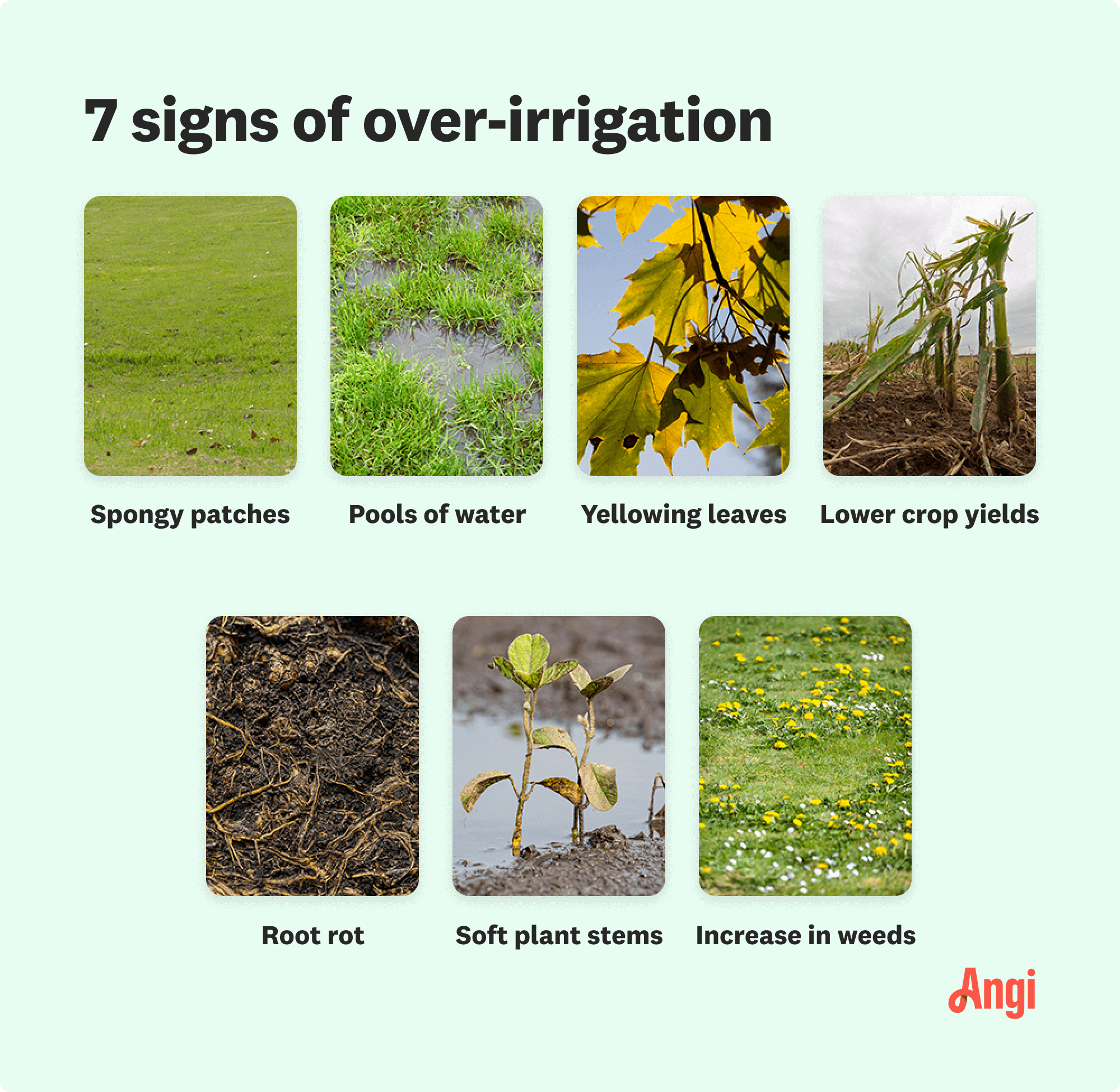
Discover the cost to winterize a sprinkler system, including average prices, key cost factors, and tips to save. Learn what impacts your estimate and how to budget.
Save your soil


Overwatering your grass, flowers, and plants can cause nutrient loss and disease.
It can also lead to soil compaction, which reduces how much oxygen reaches the roots.
Common signs of over-irrigation include spongy patches and pools of water in your yard.
Yellowing leaves, lower crop yields, and increased weeds are other signs of overwatering.
Drip irrigation, timed sprinklers, and drainage systems can prevent over-irrigation.
You’ve been ultra-diligent about watering your lawn to make sure it grows thick and healthy, but for some reason, it still doesn’t look quite right. As it turns out, you could be overwatering it—and, in the process, harming the soil underneath it. So, how is over-irrigation damaging to soil? Here’s what to know.

Overwatering is harmful to your soil and can lead to a number of issues, including nutrient loss, increased soil salinity (saltiness), soil compaction, and plant disease. Here’s why these spell trouble for your yard.
Plants’ active root zones can only hold a certain amount of water. Over-irrigating can overwhelm the roots, eventually causing the plants to lose water and essential nutrients (including nitrogen) that they need to grow.
Over-irrigation forces the ground to absorb more water than it can handle. As a result, the water table rises, and more salt reaches the plants’ active root zones. As the plants soak up the water, they’ll leave the salt behind in the soil. This can negatively affect future plant health because it’s harder for plants to absorb water in super salty soil.
Using too much water can compact your soil and limit the amount of oxygen it receives, which can threaten your plants’ health. While aerating your lawn is a good way to break up compacted soil, it might not work if you’re significantly overwatering.
In compacted soil, it’s harder for oxygen to reach the plant roots. Combine that with the excess moisture from over-irrigation, and you’ve got a breeding ground for plant diseases. The saturated soil and lack of oxygen can lead to root rot, which can weaken and kill plants of all sizes.

So, how do you know if you have soil damage due to overwatering? Here are a few common signs:
Runoff into your drainage system, neighborhood storm drain, or neighboring properties
Spongy patches or standing water in your yard
Increase in weeds (especially varieties that thrive in nutrient-deprived or soggy soil, such as crabgrass, dandelions, and dock)
Reduced crop yields
High water bills
Overwatering isn’t just bad for your lawn. It’s also bad for the environment and your wallet. Fortunately, there are a variety of ways to prevent over-irrigation and save your plants.
To water more efficiently, consider installing a sprinkler system or drip irrigation system. Both systems run automatically and can be customized to provide more or less water to individual areas, depending on what’s in each section. Contact a local sprinkler repair pro to install one.
On average, installing a sprinkler system costs $1,600 to $3,600, which includes multiple sprinkler heads and irrigation zones. Installing a ground-level drip irrigation system costs $200 to $850.
"Installing an irrigation system in a newly built home costs less than installing one in an existing home. Why? Older homes and yards have established root systems and old water lines you have to dig through or remove. New builds are a blank slate with nothing in your way, so installation takes less time."
— Tom Smith, Owner of Desert Designer Landscape and Development, Phoenix, Arizona
If you already have an irrigation system, adjust the settings to water less often. For example, if your automatic sprinkler system currently runs for an hour three times per week, change it to run for an hour twice per week.
With this tool, you can monitor your soil’s moisture level and change your watering schedule based on its findings. You’ll pay around $10 for a basic model or over $200 for one with advanced features, like smartphone connectivity.
Yard drainage systems are designed to divert excess water away from a particular area (for instance, your lawn or garden) into a place better suited to absorb it. There are many ways to set up a drainage system, with some popular options including dry creek beds, French drains, and rain gardens.
From average costs to expert advice, get all the answers you need to get your job done.

Discover the cost to winterize a sprinkler system, including average prices, key cost factors, and tips to save. Learn what impacts your estimate and how to budget.

Discover drip irrigation system cost estimates, key price factors, and ways to save. Get transparent pricing to plan your home irrigation project confidently.

Find out the average sprinkler system repair cost, what impacts pricing, and how to save. Get transparent estimates to plan your sprinkler repair project.

Putting your sprinkler system to bed for winter will help avoid damage from freezing temperatures. Use this guide to winterize your sprinkler system.

How do smart sprinklers work? Like all smart technology, smart irrigation systems use the power of the internet and real-time data to adjust your watering schedule. Learn more.

Need to repair a sprinkler or install a new one? Learn the parts of the sprinkler system and how they all work together to water your lawn and garden.